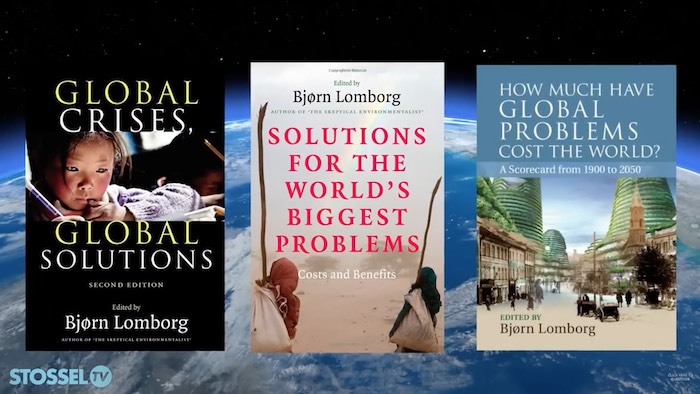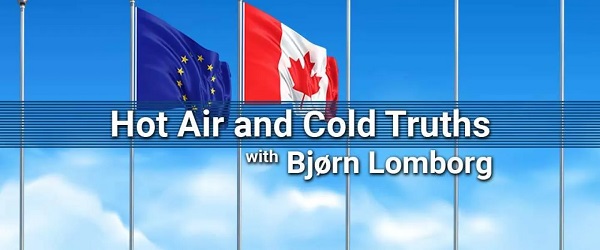Bjorn Lomborg
Actions That Would Do More Good Than Wasting Trillions on Climate Change

From Stossel TV
Bjorn Lomborg studies solutions for the world’s biggest problems. He says we should spend on the “best things first.”
I asked people on the street in New York how they’d spend money to help the world. Fixing climate change was the most common answer.
Lomborg agrees that climate change is a problem that may threaten our kids someday. But he also says, “if you live most other places on the planet, you’re worried about the fact that your kids might die from easily curable diseases tonight.”
Lomborg has a cheaper plan that would save millions of lives.
———— To get our new weekly video from Stossel TV, sign up here: https://www.johnstossel.com/#subscribe ————
After 40+ years of reporting, I now understand the importance of limited government and personal freedom.
——————————————
Libertarian journalist John Stossel created Stossel TV to explain liberty and free markets to young people. Prior to Stossel TV he hosted a show on Fox Business and co-anchored ABC’s primetime newsmagazine show, 20/20.
Stossel’s economic programs have been adapted into teaching kits by a non-profit organization, “Stossel in the Classroom.” High school teachers in American public schools now use the videos to help educate their students on economics and economic freedom. They are seen by more than 12 million students every year.
Stossel has received 19 Emmy Awards and has been honored five times for excellence in consumer reporting by the National Press Club. Other honors include the George Polk Award for Outstanding Local Reporting and the George Foster Peabody Award
Bjorn Lomborg
The stupidity of Net Zero | Bjorn Lomborg on how climate alarmism leads to economic crisis

From spiked on YouTube
Note: This interview is focused on Europe and the UK. It very much applies to Canada. The 2025 Federal Election which will see Canadians choose between a more common sense approach, and spending the next 4 years continuing down the path of pursuing “The Stupidity of Net Zero”.
European industry is in freefall, and Net Zero is to blame.
Here, climate economist Bjorn Lomborg – author of Best Things First and False Alarm – explains how panic over climate change is doing far more damage than climate change itself. Swapping cheap and dependable fossil fuels for unreliable and expensive renewables costs our economies trillions, but for little environmental gain, Lomborg says.
Plus, he tackles the myth of the ‘climate apocalypse’ and explains why there are more polar bears than ever.
Support spiked: https://www.spiked-online.com/support/
Sign up to spiked’s newsletters: https://www.spiked-online.com/newslet…
2025 Federal Election
Don’t double-down on net zero again

From the Fraser Institute
In the preamble to the Paris Agreement, world leaders loftily declared they would keep temperature rises “well below 2°C” and perhaps even under 1.5°C. That was never on the cards—it would have required the world’s economies to effectively come to a grinding halt.
The truth is that the “net zero” green agenda, based on massive subsidies and expensive legislation, will likely cost more than CAD$38 trillion per year across the century, making it utterly unattractive to voters in almost every nation on Earth.
When President Trump withdrew the United States from the Paris Climate Agreement for the first time in 2017, then-Canadian Prime Minister Justin Trudeau was quick to claim the moral high ground, declaring that “we will continue to work with our domestic and international partners to drive progress on one of the greatest challenges we face as a world.”
Trudeau has now been swept from the stage. On his first day back in office, President Trump signed an executive order that again begins the formal, twelve-month-long process of withdrawing the United States from the Paris Agreement.
It will be tempting for Canada to step anew into the void left by the United States. But if the goal is to make effective climate policy, whoever is Canada’s prime minister needs to avoid empty virtue signaling. It would be easy for Canada to declare again that it’ll form a “coalition of the willing” with Europe. The truth is that, just like last time, that approach would do next to nothing for the planet.
Climate summits have generated vast amounts of attention and breathless reporting giving the impression that they are crucial to the planet’s survival. Scratch the surface, and the results are far less impressive. In 2021, the world promised to phase-down coal. Since then, global coal consumption has only gone up. Virtually every summit has promised to cut emissions but they’ve increased almost every single year, and 2024 reached a new high.
Way before the Paris Agreement was inked, the Kyoto Protocol was once sold as a key part of the solution to global warming. Yet studies show it achieved virtually nothing for climate change.
In the preamble to the Paris Agreement, world leaders loftily declared they would keep temperature rises “well below 2°C” and perhaps even under 1.5°C. That was never on the cards—it would have required the world’s economies to effectively come to a grinding halt.
The truth is that the “net zero” green agenda, based on massive subsidies and expensive legislation, will likely cost more than CAD$38 trillion per year across the century, making it utterly unattractive to voters in almost every nation on Earth.
The awkward reality is that emissions from Canada, the EU, and other countries pursuing climate policies matter little in the 21st century. Canada likely only makes up about 1.5 per cent of the world’s emissions. Add together Canada’s output with that of every single country of the rich-world OECD, and this only makes up about one-fifth of global emissions this century, using the United Nations’ ‘middle of the road’ forecast. The other four-fifths of emissions come mostly from China, India and Africa.
Even if wealthy countries like Canada impoverish themselves, the result is tiny — run the UN’s standard climate model with and without Canada going net-zero in 2050, and the difference is immeasurable even in 2100. Moreover, much of the production and emissions just move to the Global South—and even less is achieved.

One good example of this is the United Kingdom, which—like Prime Minister Trudeau once did—has leaned into climate policies, suggesting it would lead the efforts for strong climate agreements. British families are paying a heavy price for their government going farther than almost any other in pursuing the climate agenda: just the inflation-adjusted electricity price, weighted across households and industry, has tripled from 2003 to 2023, mostly because of climate policies. This need not have been so: the US electricity price has remained almost unchanged over the same period.
The effect on families is devastating. Had prices stayed at 2003 levels, an average family-of-four would now be spending CAD$3,380 on electricity—which includes indirect industry costs. Instead, it now pays $9,740 per year.
Rising electricity costs make investment less attractive: European businesses pay triple US electricity costs, and nearly two-thirds of European companies say energy prices are now a major impediment to investment.
The Paris Treaty approach is fundamentally flawed. Carbon emissions continue to grow because cheap, reliable power, mostly from fossil fuels, drives economic growth. Wealthy countries like Canada, the US, and European Union members have started to cut emissions—often by shifting production elsewhere—but the rest of the world remains focused on eradicating poverty.
Poor countries will rightly reject making carbon cuts unless there is a huge flow of “climate aid” from rich nations, and want trillions of US dollars per year. That won’t happen. The new US government will not pay, and the other rich countries cannot foot the bill alone.
Without these huge transfers of wealth, China, India and many other developing countries will disavow expensive climate policies, too. This potentially leaves a rag-tag group led by a few Western European progressive nations, which can scarcely afford their own policies and have no ability to pay off everyone else.
When the United States withdrew from the Paris Agreement in 2017, Canada’s doubling down on the Paris Treaty sent the signal that it would be worthwhile spending hundreds of trillions of dollars to make no real difference to temperatures. We fool ourselves if we pretend that doing so for a second time will help the planet.
We need to realize that fixing climate change isn’t about sanctimonious summits, lofty speeches, and bluster. In coming weeks I’ll outline the case for efficient policies like innovation, adaptation and prosperity.
-

 2025 Federal Election1 day ago
2025 Federal Election1 day agoRCMP memo warns of Chinese interference on Canadian university campuses to affect election
-

 Alberta2 days ago
Alberta2 days agoAlberta takes big step towards shorter wait times and higher quality health care
-

 2025 Federal Election1 day ago
2025 Federal Election1 day agoResearchers Link China’s Intelligence and Elite Influence Arms to B.C. Government, Liberal Party, and Trudeau-Appointed Senator
-

 Business2 days ago
Business2 days agoTrump raises China tariffs to 125%, announces 90-day pause for countries who’ve reached out to negotiate
-

 2025 Federal Election1 day ago
2025 Federal Election1 day agoThe status quo in Canadian politics isn’t sustainable for national unity
-

 2025 Federal Election1 day ago
2025 Federal Election1 day agoPoilievre Announces Plan To Cut Taxes By $100,000 Per Home
-

 2025 Federal Election22 hours ago
2025 Federal Election22 hours agoTwo Canadian police unions endorse Pierre Poilievre for PM
-

 Business1 day ago
Business1 day agoScott Bessent Says Trump’s Goal Was Always To Get Trading Partners To Table After Major Pause Announcement






